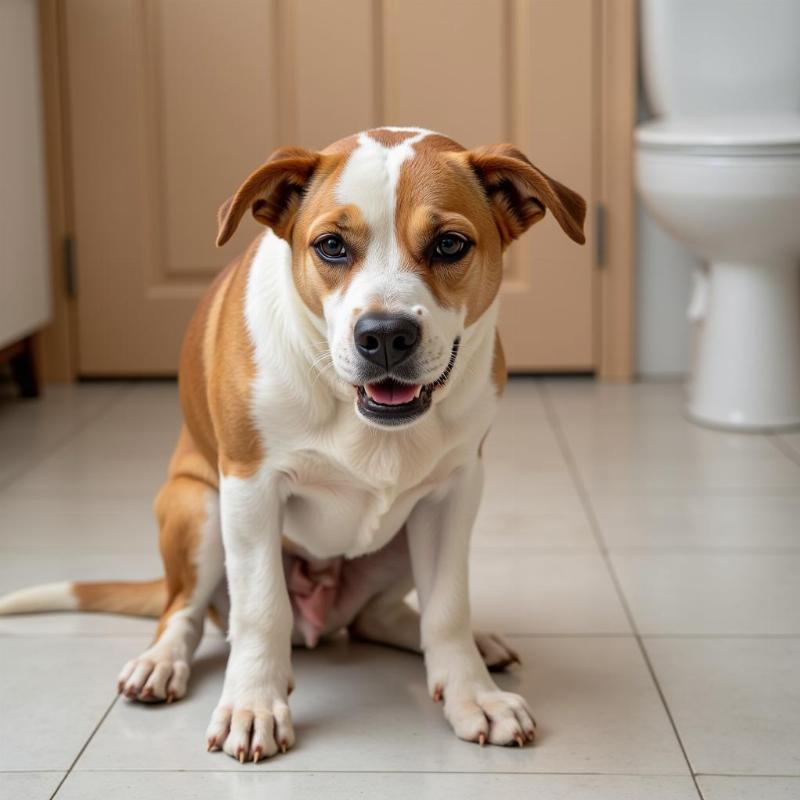UFD in dogs stands for Urolithiasis, Feline and Canine, which essentially means urinary stones or crystals in both cats and dogs. While the term includes “feline,” it’s important to understand that dogs also suffer from this condition. UFD is a common problem that can cause pain and discomfort, and if left untreated, it can lead to more serious health issues. This article will help you understand UFD in dogs, its causes, symptoms, treatment options, and how you can help prevent it.
Understanding UFD (Urolithiasis, Feline and Canine) in Dogs
UFD occurs when minerals in a dog’s urine crystallize and form stones, ranging in size from tiny grains of sand to larger pebbles. These stones can form anywhere in the urinary tract, including the kidneys, bladder, and urethra. The type of stone formed depends on the mineral composition, which can be influenced by diet, genetics, and underlying health conditions. UFD can affect any breed of dog, but some breeds are more prone to developing specific types of stones. Knowing your dog’s breed predispositions can be beneficial in preventing UFD.
Common Types of UFD Stones in Dogs
Several types of urinary stones can form in dogs, with the most common being struvite, calcium oxalate, and urate. Struvite stones are often associated with urinary tract infections. Calcium oxalate stones are frequently seen in breeds like Miniature Schnauzers, Shih Tzus, and Lhasa Apsos. Urate stones are sometimes linked to liver shunts, a condition more common in Dalmatians and Bulldogs. Understanding the different stone types is crucial for developing an effective treatment plan.
Symptoms of UFD in Dogs
The symptoms of UFD in dogs can vary depending on the size and location of the stones. Some dogs may show no symptoms at all, especially in the early stages. However, common signs include frequent urination, straining to urinate, blood in the urine, and licking the genital area excessively. In more severe cases, dogs might exhibit signs of pain, lethargy, vomiting, and loss of appetite. If you notice any of these symptoms, it’s crucial to seek veterinary care immediately.
 Dog exhibiting signs of UFD
Dog exhibiting signs of UFD
Diagnosis and Treatment of UFD
A veterinarian will diagnose UFD through a combination of physical examination, urinalysis, urine culture, and imaging techniques like X-rays or ultrasound. Treatment options depend on the type and size of the stones. Small stones may be passed naturally with increased water intake, while larger stones might require surgical removal or dissolution therapy using specialized diets. In cases of recurrent UFD, dietary changes and preventative medications may be recommended.
Preventing UFD in Dogs
Prevention is often the best medicine when it comes to UFD. Ensuring your dog has access to fresh, clean water at all times is crucial to dilute the urine and prevent crystal formation. Feeding a balanced, high-quality diet appropriate for your dog’s breed and age can also significantly reduce the risk of UFD. Regular veterinary checkups can help detect any early signs of urinary problems and allow for prompt intervention.
Conclusion
UFD, or Urolithiasis, Feline and Canine, is a common condition affecting dogs that involves the formation of urinary stones. Recognizing the symptoms, understanding the causes, and seeking appropriate veterinary care are essential for effective management and prevention of UFD. By providing your dog with proper hydration, a balanced diet, and regular veterinary checkups, you can help ensure their long-term urinary health.
FAQ
- What are the most common signs of UFD in dogs? Frequent urination, straining to urinate, blood in the urine, and excessive licking of the genital area.
- How is UFD diagnosed? Through physical examination, urinalysis, urine culture, and imaging like X-rays or ultrasound.
- Can UFD be prevented? Yes, by ensuring adequate hydration, feeding a balanced diet, and scheduling regular veterinary checkups.
- What are the treatment options for UFD? Increased water intake, surgical removal, dissolution therapy, and dietary changes.
- Is UFD painful for dogs? Yes, it can cause significant pain and discomfort, especially in more severe cases.
- Are certain dog breeds more prone to UFD? Yes, some breeds have a higher predisposition to developing specific types of urinary stones.
- What should I do if I suspect my dog has UFD? Contact your veterinarian immediately for diagnosis and treatment.
Beautdogs.us is your trusted source for comprehensive dog care information, breed insights, and product recommendations. We cater to both novice and experienced dog owners, offering expert advice and practical tips to help you navigate the wonderful world of dog companionship. Contact us at [email protected] or +1 501-555-7529. Visit Beautdogs.us today for all your dog care needs.